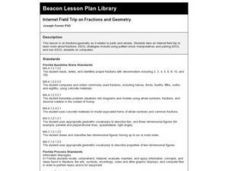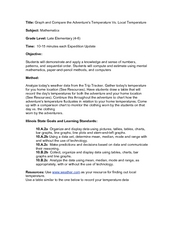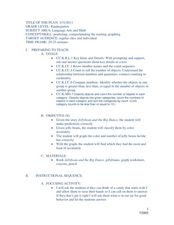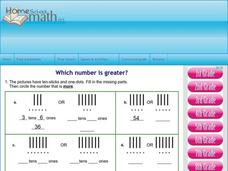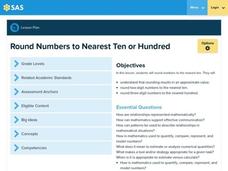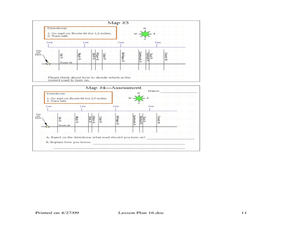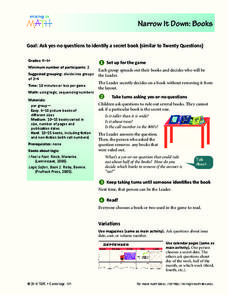Curated OER
More or Less Than
Students practice completing equations with the less than or more than symbol. They use index cards to create the equations. They compete with other groups to get the most correct.
Pennsylvania Department of Education
Adding and Subtracting Rational Numbers to Solve Problems
Learners explore the concept of probability. In this probability lesson, students use area to determine probability. Learners use charts and spinners to help determine the probability of events such as flipping a coin or rolling a...
Curated OER
Internet Field Trip on Fractions and Geometry
Students take an Internet field trip to research fractions. ESOL strategies include using pattern block manipulatives and pairing ESOL and non-ESOL students on computers.
Curated OER
Algebra: What's My Rule?
Students apply higher level thinking skills to determine rules for sorting and classification. In this pre-algebra lesson plan, students nominate classmates who they think satisfy the unspoken "rule" established by the leader. As...
Curated OER
Counting in Espanol
Students identify the Spanish numbering system from 1-10 and create a mini-book of the numbers. Students compare the English numbers to the Spanish numbers.
Curated OER
Graph and Compare the Adventure's Temperature Vs. Local Temperature
Students explore the concept graphing data. In this graphing data instructional activity, students use weather data from their local weather and some other city and graph them. Students plot the local weather vs. another city. Students...
Ohio Department of Education
Fraction and Decimal Equivalency
Mathematicians make representations of fractional parts of a whole and learn that a decimal is another way to represent a fractional part. Understanding is extended by comparing and ordering fractions and decimals on a number line. This...
Curated OER
Study Buddies: Adding and Subtracting Decimals
In this math worksheet, young scholars will work with a coach to add and subtract numbers with decimals to the hundredths. Students will follow a step-by-step process and notes are provided for the coach.
Curated OER
Length Lotto-Teacher's Notes
Young scholars convert metric units of length, specifically meters, centimeters, and millimeters. In this lesson of converting measurements, students participate in various games which require them to put the measurements in order or...
Curated OER
Food Pyramid Power: Looking Back and Moving Forward
Students show their knowledge of properties of objects as it pertains to sorting and creating patterns. In this food pyramid power lesson, students show their ability to use whole numbers in different representations by appling...
Curated OER
The Jellybeans and the Big Dance
Enchant your youngsters by reading them The Jellybeans and the Big Dance, by Laura Numeroff and Nate Evans. Ask them to name objects that begin with the letter J like jellybeans. Give each of them some jellybeans to sort by color. They...
Curated OER
Understanding number to 100
Students research equivalent representations of numbers using the base 10 system. In this Base 10 lesson, students examine place value, representations of numbers, and multiples of one, ten, and one-hundred.
Curated OER
Which Number is Greater?
Pupils draw pictures of two digit numbers to identify the greater value. In this math lesson, students plot two digit numbers on a number line and identify the greatest or lesser value. Pupils use the greater than and less than symbols...
Curated OER
Fire Fighting Crew
High schoolers use the concepts in statistics to make decisions. They calculate the mean, median and mode. They compare one firefighter against another and analyze the data. They share their information with the class.
Pennsylvania Department of Education
Round Numbers to Nearest Ten or Hundred
Third graders review telling time. For this lesson on telling time, 3rd graders discuss various items that show length of time, including clocks, calendars and sand timers. Students review and practice what they already know about...
Curated OER
Roll a Decimal
Third graders take turns rolling the die, and selects an appropriate place to put the digit that was rolled in order to create a number with the largest value possible. They compete by trying to roll the highest valued number with the die.
Curated OER
One Vs. One Hundred
Students explore the concept of place value. They differentiate between digits and their values as it related to addition and subtraction. Through the use of technology and manipulatives students investigate the place value of digits by...
EngageNY
Decimal Expansions of Fractions, Part 2
Develop your pupils' understanding of fractions and their decimal equivalence using the 12th instructional activity in this series. Scholars learn an alternative to long division that results in converting fractions to decimals that...
Curated OER
Absolute Value Bingo
Learners explore some different concepts in relation to using a number line for instruction. Given some number values, they graph the position on the number line. The lesson ends with them playing Bingo.
Curated OER
Hand Span and Height
Is there a relationship between hand span width and height? Statisticians survey each other by taking measurements of both. A table that can hold data for 24 individuals is printed onto the worksheet, along with questions for analysis....
Curated OER
Where Should You Turn?
Fourth graders complete activities to study decimal numbers. In this decimal numbers instructional activity, 4th graders study decimal numbers to express numbers less than one and intervals. Students complete map and location activities...
Pennsylvania Department of Education
Seeing Doubles
Students work with dominoes to recognize the number of spots on each side as they relate to addition facts. In this seeing doubles lesson, students make triangle shaped flash cards for the double facts. Students represent the correct...
Curated OER
Narrow It Down: Books
Students ask yes-no questions to identify a secret book. In this asking questions lesson, students ask yes or no questions about books to identify a secret book. Students identify the book and then read one of the example books.
Curated OER
Egyptian Hireroglyphs
Fifth graders identify the aspects of Ancient Egyptians and Heiroglyphs. They compare and contrast Egyptian Hieroglyphs with the decimal number system. Students recognize the decimal number system and compares to bases other than ten.




